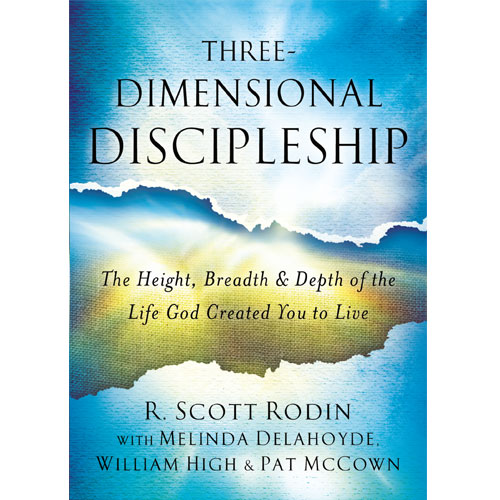Thanksgiving Is All in Your Head (or it should be)

November 23, 2023
The Oxford Dictionary defines thanksgiving as, “the feeling of being happy or grateful because of something.”[1] With all due respect, I think the Oxford Dons got it wrong. What they’ve described is thanksfeeling. If they are right, then it will only take a brief viewing of local, national, and world news to convince you to leave the turkey in the freezer and cancel the pumpkin pie.
Thanksfeeling throws us back upon ourselves to somehow conjure up sentiments of lightheartedness and appreciation for a ‘list of blessings’ amidst the chaos of our world. Rather than feeling thankful, it may just leave us feeling empty. Perhaps that’s why, for so many on “turkey day,” the lone success metric is getting along with the family for four hours. Why such a gloomy outlook? Let’s take a look.
We are witnessing horrific wars in the Ukraine and the Middle East. Both are devastating lives overseas and tearing our country apart here, driving deeper wedges in an already divided culture. Putin, Xi, and other world leaders seem bent on strategies to undermine and ultimately destroy us. Internally, we are free-falling into an abyss where sin is normalized, and what used to be morally reprehensible is now unquestionable. Our cities are being overrun with homelessness and hopelessness, we have a fentanyl and opioid overdose epidemic, children are being sex trafficked at an alarming rate, climate change threatens to end our existence, and artificial intelligence is only a few steps away from machines taking over the world. When you add post-pandemic isolation and the decline of the church and its Judeo-Christian values, it’s no wonder the US surgeon general proclaimed loneliness and depression as the most significant epidemics of our day.
How are we, as the body of Christ, supposed to celebrate Thanksgiving in such dark and evil times? I propose that it is all a matter of our minds. Scripture admonishes us to be stewards of how we think. We are told that we have the mind of Christ (1 Corinthians 2:16), that we need to be transformed by the renewing of our mind (Romans 12:2), that we need to prepare our minds for action (1 Peter 1:13), and keep our minds set on what the Spirit desires (Romans 8:5). It promises that the mind governed by the Spirit is life and peace (Romans 8:6) admonishes us to love the Lord with all our mind (Mark 12:30), to be of one mind and live in peace (2 Corinthians 13:11), so that we will be made new in the attitude of your minds (Ephesians 4:23). We are commanded to have the same mindset as Christ Jesus (Philippians 2:5), and to set your minds on things above (Colossian 3:2).
How might stewarding our minds help us celebrate Thanksgiving in these troubled times? Let’s look at one more text. I must confess, I’ve read these verses many times and have usually chosen to skip over them because I’ve never known exactly what to do with them. I believe, however, there is a key for us here as we enter this Thanksgiving week. These verses come on the heels of Paul’s promise to the church in Philippi that the peace of God that passes all understanding will guard their hearts and minds in Christ Jesus. (4:7) He continues,
Finally, brothers and sisters, whatever is true, whatever is noble, whatever is right, whatever is pure, whatever is lovely, whatever is admirable—if anything is excellent or praiseworthy—think about such things. (Philippians 4:8)
The Greek[2] word translated as ‘think’ is logízomai, which means to meditate, dwell, reckon, and take into account. Paul wants the church to focus their minds on these eight things. It is a fascinating list. As we define each, I want us to consider them in three ways. First, they are attributes of God, descriptors of His nature. Second, as people made in the image of God, they are also to be lived out in our own attitudes, values, and behaviors. Finally, they are markers of the coming kingdom, and in this way, they are the source of our hope.
‘Whatever is true’. The Greek word alēthḗs means that which is tested and proven factual. It is an undeniable reality. Jesus Christ proclaimed He was the Truth. As His disciples, we walk in truth as we are being transformed into His image. The truth is not a belief. It is not ours to shape into a comfortable form as we see fit. It is not relative to our circumstances or malleable to our own biases. There is only one Truth, and He hung on a cross for us. The enemy is spewing out lies about what is true in our world. What might it mean for you to dwell on the one Truth this week?
‘Whatever is honorable’. Here the Greek word semnós means “to revere, be in awe.” It refers to what is august, weighty, deeply respected, and majestic. Our broken world honors what should be detestable and reveres those who march to win the right to justify their sin. This week, what might it mean to name the counterfeit things we honor and dwell solely on the song’s words, ‘Majesty, worship His majesty, unto Jesus, be all glory, honor, and praise’?
‘Whatever is Right’. The Greek word here is díkaios, which means “approved by God, righteous, just in the eyes of God, conformity to God’s standard, justice, in conformity to God’s own being.” Why would Paul have us meditate on God‘s righteousness, His justice? Perhaps it will be a reminder to us that there is an ultimate source of justice and rightness in the world. There is hope in God’s intent to make all things right. As we dwell on that thought, how might God’s righteousness make us thankful, and how might it be lived out in us?
‘Whatever is Pure’. The Greek word hagnós means “holy, pure,chaste, unadulterated, pure inside and out, uncontaminated, undefiled from sin, without spoliation even down to the center of one’s being.” In an age where the church no longer discusses sin, it should not surprise us that we are also not discussing holiness. But Peter challenges us with God’s command, “Be holy, for I am holy.” (1 Peter 1:16). As we think about the purity and perfect goodness of God, how might that encourage our thankfulness, and how might the Holy Spirit work that same purity in us?
‘Whatever is Lovely’. prosphilḗs is the Greek word for “worthy of personal affection, dearly prized, worth the effort to have and embrace.” It’s interesting here that the Greek word does not talk about things that are necessarily pleasing to our eye, what we would call loveliness. Instead, it speaks to that which elicits in us a response of affection, literally inspiring us to give a hug. What a beautiful picture of the nature of God. When we encounter Him and know Him as we do in Jesus Christ, we are filled with that two-fold response: awe and affection. Dwell this week on the loveliness of God and follow your heart into His embrace. Then, ask how you might be lovely in the same way to all those with whom you journey.
‘Whatever is Admirable. The Greek word here is εὔφημος, which can be defined as “sounding well, uttering words of good omen, speaking auspiciously, things spoken in a kindly spirit, with good-will to others.” If ‘lovely’ describes what we feel, admirable signals what we hear. How do we listen for God’s voice? Do we expect it to be a word spoken in a kindly spirit? A word of goodwill, love, and grace? Ponder the nature of a God who is for you. Listen for the Father’s words of blessing, “you are my beloved child, in you I am well pleased.” Then let your words to others bear witness to the same kindly spirit, filled with goodwill.
‘Whatever is Excellent’. Paul uses the Greek word ἀρετή, to mean “any excellence of a person (in body or mind) or of a thing, an eminent endowment, property or quality, a virtuous course of thought, feeling and action, virtue, moral goodness, and any particular moral excellence, as modesty, purity.” How wonderful it is to meditate on the idea that our God and everything He does is exemplary, excellent, and far above all expectations. Do we believe He is at work bringing about His excellent and perfect will in our world today? If we do, if we can dwell on the excellence of God – both His nature and His work – we will find peace in the tumult. May it also cause us to consider how, as His hands and feet, we can bear witness to the excellence of God in all we do.
‘Whatever is Worthy of Praise’. Finally, Paul chooses the wordépainos, which means “fitting, apt, enthusiastic acknowledgment for what deserves praise.” What a wonderful way to end this list. How might we ‘enthusiastically acknowledge that He deserves praise’? How might our dwelling in His fitness for such praise shape our hearts and minds this week? And how might we, too, live lives that are worthy of praise? Perhaps that is a summation of all that has come before. Would not a life that exemplifies truth, honor, justice, holiness, affection, kindness, and excellence, be one that would be worthy of praise?
Going from thanksfeeling to Thanksgiving depends on correct thinking, and correct thinking flows over into right living. Paul goes on to say, “Whatever you have learned or received or heard from me or seen in me—put it into practice. And the God of peace will be with you.” (Philippians 4:9)
God has promised to keep in perfect peace the one whose mind is stayed on Him. He promised that He would garrison our hearts, minds, emotions, and innermost thoughts as we focus our prayers and praises on Him – with thanksgiving!
Let us think about these things. Happy Thanksgiving.
[1] https://dictionary.cambridge.org/us/dictionary/english/thankfulness
[2] All Greek translations and definitions came from Strong’s Concordance, found at https://biblehub.com/philippians/4-8.htm





